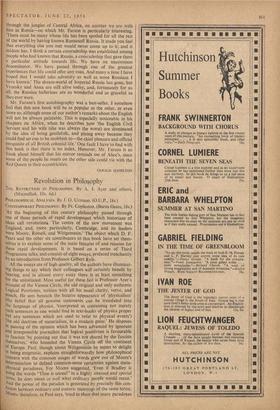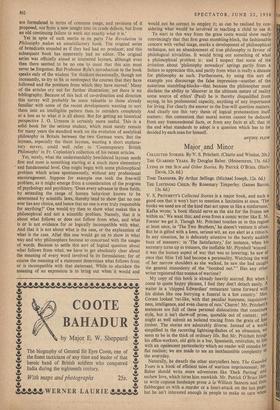Revolution in Philosophy
PillLOSOPHICAL ANALYSIS. By J. 0. Urnison. (O.U.P., 18s.) CONTEMPORARY PHILOSOPHY. By Fr. Copleston. (Burns Oates, 18s.) AT the beginning of this century philosophy passed through one of those periods of rapid development which historians of ideas call revolutions. The centre of the new movement was England, and, more particularly, Cambridge, and its leaders Were Moore, Russell, and Wittgenstein.' The object which D. F. Pears and the other six contributors to this book have set them- selves is to explain some of the main features of and reasons for these rapid developments. It is based on a series of Third Programme talks, and consists of eight essays, prefaced trenchantly' by an introduction from Professor Gilbert Ryle.
All the essays are of high quality, all the authors have illuminat- 'rig things to say whicl? their colleagues will certainly benefit by hearing, and in almost every essay there is at least something f )r the uninitiated. Most useful for these last is Professor Ayer's Account of the Vienna Circle, the old original and only authentic Logical Positivists, written with all his usual sclarity, verve, and Punch. He sees beneath the bizarre appearance of 'physicalism' ( lie belief that all genuine statements can be translated into the language of physics, 'interpreted as containing not merely s 'eh sentences as one would find in text-books of physics proper but any sentences which are used to refer to physical events') the old doctrine of materialism, in a modern guise.' He disposes In passing of the opinion which has been advanced by ignorant and irresponsible journalists that logical positivism is favourable 13 fascism 'by pointing out that it was not shared by the fascists themselves,' who hounded the Vienna Circle off the continent
or - Europe. Paul, though about Wittgenstein he seems to delight
In being enigmatic, explains straightforwardly how philosophical concern with the common usages of words grew out of. Moore's determination to defend common-sense certainties against meta- physical paradoxes. For Moore suggested, 'Even if Bradley is using the words "Time is unrearin a highly unusual and special sense, he does mean as well what ordinary people would mean.' And the power of the paradox is generated by precisely this con- fusion between ordinary and esoteric meanings of the same terms. Moore therefore, as Paul says, 'tried to show that many paradoxes are formulated in terms of common usage, and revisions of it proposed, not from a new insight into its crude defects, but from an old continuing failure to work out exactly what it is.'
Yet in spite of such merits in its parts The Revolution in Philosophy ,makes an unsatisfactory book. The original series of broadcasts sounded as if they had had no producer, and this subsequent book has apparently had no editor. The original series was officially aimed at interested laymen, although even then there seemed to be no one to insist that this aim must never be forgotten. But Professor Ryle's introduction to the book speaks only of the wisdom 'for thinkers occasionally, though not incessantly, to try to fix in restrospect the courses that they have followed and the positions from which they have moved.' Many of the articles cry out for further illustration; yet there is no bibliography. Because of this lack of co-ordination and direction this survey will probably be more valuable to those already familiar with some of the recent developments wanting to sort them into an intelligible pattern than to outsiders completely at a loss as to what it is all about. But for getting an historical perspective J. 0. Urmson is certainly more useful. This is a solid book for the serious student, which must surely remain for many years the standard work on the evolution of analytical philosophy in Britain between the two German wars. But the layman, especially the theist layman, wanting a short explana- tory survey, could well refer to 'Contemporary British Philosophy' in Fr. Copleston's collection of his recent articles.
Yet, surely, what the understandably bewildered layman needs first and most is something starting at a much more elementary and fundamental level. One might begin with some philosophical problem which arises spontaneously, without any professional encouragement. Suppose for example one took the free-will problem, as it might emerge from a consideration of the progress of psychology and psychiatry. 'Does every advance in these fields, by extending the range of human behaviour known to be determined by scientific laws, thereby tend to show that no one ever has any choice, and hence that no one is ever truly responsible for anything?' One would try then to show what makes this a philosophical and not a scientific problem. Namely, that it is about what follows or does not follow from what, and what is or is not evidence for or logically incompatible with what. And that it is not about what is the case, or the explanation of what is the case. After this one would go on to show in what way and why philosophers become so concerned with the usages of words. Because to settle this sort of logical question about what follows from what, we have to get absolutely clear about the meaning of every word involved in its formulation; for of course the meaning of a statement determines what follows from or is incompatible with that statement. While to elucidate the meaning of an expression is to bring out when it would and would not be correct to employ it; as can be realised by con- sidering what would be involved in teaching a child to use it.
To start in this way from the grass roots would show really convincingly that that first great stumbling-block, the fashionable concern with verbal usage, marks a development of philosophical technique, not an abandonment of true philosophy in favour of philological trivialities. It would bring out something of what a philosophical problem is : and I suspect that some of the irritation about 'philosophy nowadays' springs partly from a failure to appreciate this, and partly from what is really a distaste for philosophy as such. Furthermore, by using this sort of example you discourage the false impression—another, of the notorious stumbling-blocks—that because the philosopher must disclaim the ability to 'discover in the ultimate nature of reality some source of ethics' (Paul) he is thereby disqualified from saying, in his professional capacity, anything of any importance for living. For clearly the answer to the free-will question matters. And clearly too this very thesis of logical protestantism itself matters : this contention that moral norms cannot be deduced from any transcendental facts, or from any facts at all; that in the end what standards to adopt is a question which has to be decided by each man for himself.
ANTONY FLEW



































 Previous page
Previous page